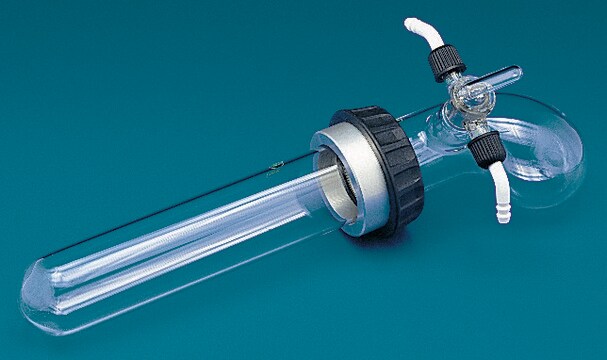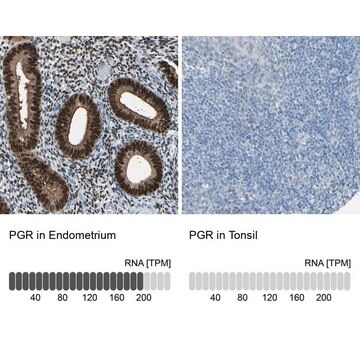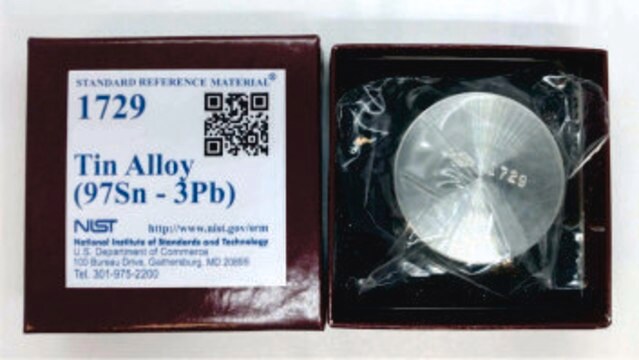Alle Fotos(2)
Wichtige Dokumente
GF91314468
Zinn
rod, 500mm, diameter 2.0mm, 99.999+%
Synonym(e):
Zinn
Anmeldenzur Ansicht organisationsspezifischer und vertraglich vereinbarter Preise
Alle Fotos(2)
About This Item
Empirische Formel (Hill-System):
Sn
CAS-Nummer:
Molekulargewicht:
118.71
MDL-Nummer:
UNSPSC-Code:
12141745
PubChem Substanz-ID:
NACRES:
NA.23
Empfohlene Produkte
Assay
≥99.999%
Form
rod
Hersteller/Markenname
Goodfellow 913-144-68
Widerstandsfähigkeit
11 μΩ-cm, 20°C
bp
2270 °C (lit.)
mp (Schmelzpunkt)
231.9 °C (lit.)
Dichte
7.310 g/mL at 25 °C (lit.)
SMILES String
[Sn]
InChI
1S/Sn
InChIKey
ATJFFYVFTNAWJD-UHFFFAOYSA-N
Allgemeine Beschreibung
For updated SDS information please visit www.goodfellow.com.
Rechtliche Hinweise
Product of Goodfellow
Hier finden Sie alle aktuellen Versionen:
Analysenzertifikate (COA)
Lot/Batch Number
Leider sind derzeit keine COAs für dieses Produkt online verfügbar.
Wenn Sie Hilfe benötigen, wenden Sie sich bitte an Kundensupport
Besitzen Sie dieses Produkt bereits?
In der Dokumentenbibliothek finden Sie die Dokumentation zu den Produkten, die Sie kürzlich erworben haben.
M R Krigman et al.
Neurotoxicology, 5(2), 129-139 (1984-01-01)
The toxicology of tin is almost entirely the toxicology of the organic compounds of tin, for the metal itself and its inorganic compounds appear to be nearly harmless for practical purposes. Furthermore, the neurotoxicity of organotin is essentially that of
Heinz Rüdel
Ecotoxicology and environmental safety, 56(1), 180-189 (2003-08-14)
This article reviews the literature related to the bioavailability of tin, inorganic tin compounds, and organotin compounds. On the one hand, the toxicity of metallic tin and inorganic tin compounds is low. In aqueous systems, the potential bioavailability of tin
Steve Blunden et al.
Food and chemical toxicology : an international journal published for the British Industrial Biological Research Association, 41(12), 1651-1662 (2003-10-18)
Tinplate is light gauge, steel sheet or strip, coated on both sides with commercially pure tin and has been used for well over a hundred years as a robust form of food packaging. Altogether, about 25,000 million food cans are
Commonly used methods of analysis for tin in foods.
W Horwitz
Journal - Association of Official Analytical Chemists, 62(6), 1251-1264 (1979-11-01)
P Mushak
Neurotoxicology, 5(2), 163-176 (1984-01-01)
Methods for both total and form-variable tin analysis in biological media are reviewed. While total tin analysis was common in the past, and in some cases still is, better understanding of the toxicology and toxicokinetics of organotins in biological systems
Unser Team von Wissenschaftlern verfügt über Erfahrung in allen Forschungsbereichen einschließlich Life Science, Materialwissenschaften, chemischer Synthese, Chromatographie, Analytik und vielen mehr..
Setzen Sie sich mit dem technischen Dienst in Verbindung.





